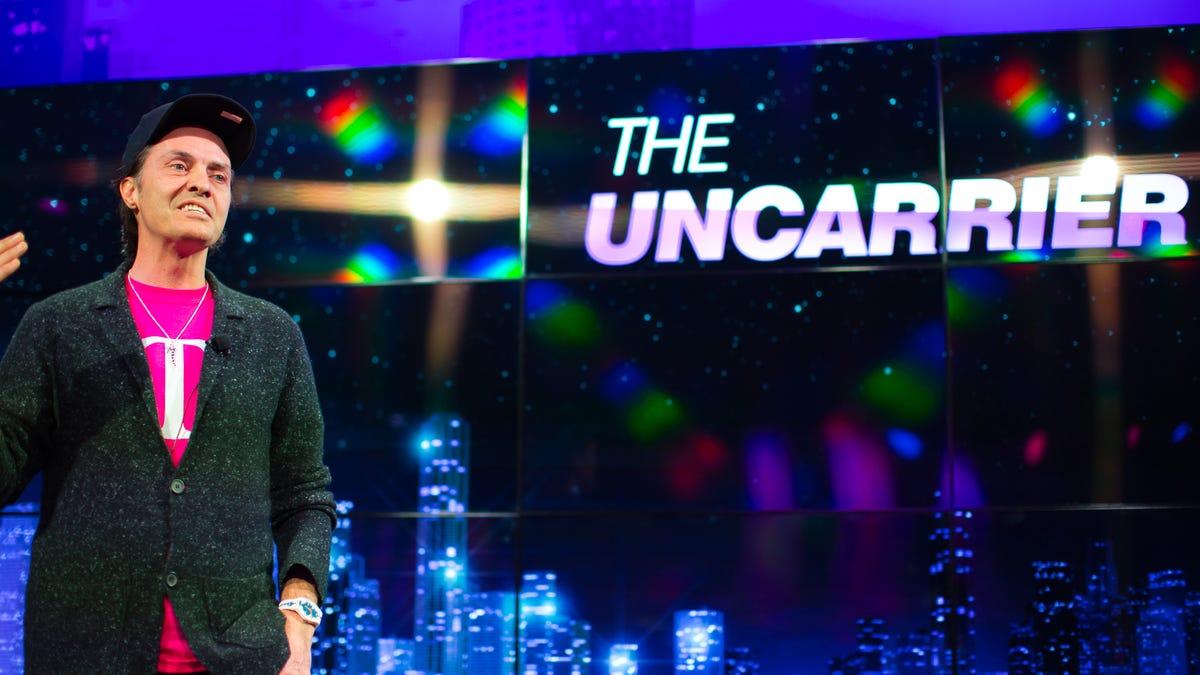T-Mobile kills off the wireless contract
The wireless carrier today seems to have finally done away entirely with contracts for wireless customers, part of broader changes intended to make T-Mobile more competitive.

T-Mobile continues to rev up the changes it's got in store for customers.
The wireless carrier today seems to have finally done away entirely with contracts for wireless customers. This follows earlier moves that had allowed options including either a traditional two-year contract or no contract at all.
The shift is part of a broader transformation that CEO John Legere hinted at during his Consumer Electronics Show press conference in January, changes that are intended to make the carrier more competitive in the industry. As a distant fourth-place carrier among the national players, the company has been willing to demonstrate more aggressiveness in turning around its subscriber losses.
What's new today? T-Mobile's Web site now shows, for instance, that a customer could select an unlimited talk, text, and Web option that includes up to 500MB of high-speed data for a single phone for $50 a month. The price rises as the data level increases -- the next increment is 2GB for $60.
The rate does not include the additional fee you pay for your phone. Instead of a subsidy, you pay a small fee on top of your phone bill each month to pay off your smartphone. But unlike the higher monthly fees you would normally pay a carrier under a contract, the fees stop once you pay off the phone.
Still, that means an additional fee for what would have been the life of a two-year contract. The
Catch our live blog from T-Mobile's "Uncarrier" event Tuesday, March 26, at 11 a.m. ET / 8 a.m. PT.
T-Mobile has slowly shifted its focus to the so-called prepaid option as those plans have proven to be more popular for the carrier than the traditional contract model. The carrier has consistently bled contract customers over the last few years, with some switching to prepaid, but others leaving for the larger competitors. During CES, T-Mobile announced it would offer its no-strings unlimited data plan without a contract, a sign of today's broader move.
T-Mobile has a press event planned for this Tuesday, March 26, at which it will likely have more to say about its plan to be a wireless company that "doesn't act like one anymore."
The company is also expected to provide an update on its 4G LTE rollout plans. For now, it is the only national carrier to lack a 4G LTE option. So far, it has argued that its HSPA+ network -- which it calls 4G -- is fast enough, and reaches more people than some of its competitors' LTE networks. The
The 4G LTE announcements should address one of the knocks on T-Mobile's service. The carrier is also expected to eventually offer the
The carrier's shift toward life in the prepaid lane is also moving forward on the business side, as its planned merger with MetroPCS last week cleared its final regulatory hurdle and now awaits just shareholder approval.
Update March 25 at 12:50 p.m. PT: T-Mobile has changed the pricing mechanism on its "individual plans" page since yesterday. Now it shows just three options -- 500MB ($50 a month), 2GB ($60), and unlimited ($70). But yesterday, it showed eight options -- 500MB, 2GB, 4GB, 6GB, 8GB, 10GB, 12GB, and unlimited -- with the price rising in $10 increments starting at the $50/500MB level, so that the high end was something like something like $100 for 10GB and $110 for 12GB -- more expensive than unlimited, which yesterday also showed for $70.
CNET's Roger Cheng contributed to this report.
(Via TmoNews.)

